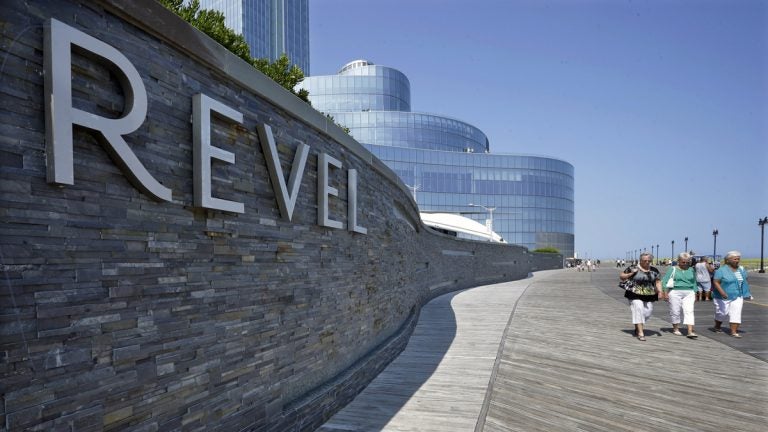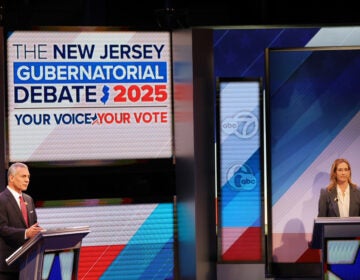Explainer: Why Atlantic City’s decline won’t implode New Jersey’s budget

Casino workers and customers walk out of The Revel Hotel Casino together early in the morning Tuesday, Sept. 2, 2014. (AP Photo/Mel Evans)
With Showboat, Revel, and Trump Plaza casinos already shut down and Trump Taj Mahal likely to close its doors later this month, most New Jerseyans would not be surprised if Gov. Chris Christie was worried about a sharp decline in casino taxes blowing a giant hole in this year’s state budget.
Christie did call a high-level summit to deal with the future of Atlantic City. But his concern was the city’s future viability as a tourist destination and the 10,000 layoffs caused by the casino closures, not the impact on state casino taxes, which are dedicated to programs for senior citizens and the disabled.
In fact, New Jersey’s casino tax rate is so far below the national average that total casino tax revenues last year made up just $220 million – a miniscule 0.6 percent of the $34.1 billion state budget. The New Jersey State Lottery generates $2.8 billion a year — 12 times as much as the casino industry did before this year’s closures.
What are New Jersey’s casino taxes? New Jersey levies an 8 percent tax on gross casino revenues, down from a 15 percent tax imposed in 1978 and 1979 during the first two years of casino gambling. Starting in 2004, the state added a $3 per day casino hotel room tax, a $3 per day parking tax, an 8 percent tax on progressive slot machine winnings. The state also added a tax on casino “comps” — hotel rooms and other services provided on a complimentary basis to customers — but that tax expired in 2009. A 15 percent tax on Internet gaming revenues was added beginning November 2013.
Are there any other taxes or fiscal obligations casinos have to pay? Yes, since 1984, casinos have had to pay an additional 1.25 percent of gross revenue to the Casino Reinvestment Development Fund to promote the urban revitalization of Atlantic City. The Casino Redevelopment Authority (CRDA) also gets $2.50 out of the parking tax and $1 of the hotel room tax to spend.
So what is New Jersey’s overall casino-tax rate, and how does it compare to other states? New Jersey’s 9.25 percent effective-tax-rate on casino earnings last year was the second lowest in the country after Nevada’s maximum of 7.75 percent, according to the National Conference of State Legislatures.
In contrast, Pennsylvania levies a 55 percent tax that generated $1.384 billion for its state treasury last year — more than six times as much tax revenue as New Jersey’s casinos on approximately the same earnings. New York State, which is scheduled to grant licenses to four more casinos in the next few years, has an even higher casino-tax rate that ranges from 60 percent to 69 percent. Delaware’s casino-tax rate is 56.23 percent, Maryland charges 67 percent, and Florida and Ohio levy casino taxes at 33 percent.
Why is New Jersey’s casino tax rate so low? From the start, New Jersey required the construction of large casino hotels as a condition for the granting of casino licenses in an effort to turn Atlantic City into a gaming resort destination rivaling Las Vegas. Pennsylvania, Delaware, and other states allowed slot machines to be installed in racetracks (so-called racinos), and other states allowed riverboat gambling and the installation of “one-armed bandits” in bars.
Didn’t New Jersey used to get more than $220 million from casino taxes? Yes, casino taxes rose steadily for years. Casino taxes cracked the $100 million mark in Fiscal Year 1982, passed $200 million in FY1988, hit $300 million in FY1996, and climbed to an all-time high of $413 million in FY2006. With $83 million coming from hotel room taxes, parking taxes, the short-lived tax on casino “comps” and other levies, total casino-tax revenue hit $500 million that year. Since then, as a result of growing competition from Pennsylvania, Delaware, and New York, casino taxes dropped steadily to $329 million in FY2009, $251 million in FY2011 and hit an all-time low of $201 million in FY2013 before rebounding slightly to $207.5 million last year with a boost from Internet gaming. That year, room taxes, parking taxes, and other miscellaneous fees added just $13 million, bringing total FY2014 casino-tax revenue to $220.6 million.
How much are casino revenues likely to decline this year as a result of the closures of Showboat, Revel, Trump Plaza and probably Trump Taj Mahal? No one has laid out any credible projections. The overall casino-tax decline may be relatively small. Caesars shut down Showboat even though the casino was making a profit under the theory that Showboat’s gamblers would migrate to the company’s other Atlantic City casinos. Borgata, the city’s most successful casino, is spending millions of dollars on upgrading its facilities to win a bigger share of Atlantic City’s gaming dollar. State officials are hoping that growth in Internet gaming revenue will more than offset losses in Atlantic City slots and table game revenues — although Internet gaming growth last year came in far lower than the Christie administration’s original projections.
So what does this mean for the state budget, and for programs for senior citizens and the disabled that casino tax revenues help support? Not much. Even if casino revenues were to drop $50 million — which is unlikely — that’s not going to cause a budget crisis. State income tax revenues routinely vary by $100 million from revenue projections, and last spring’s budget crisis was caused by a whopping $700 million shortfall in income tax collections that forced Gov. Chris Christie to cut pension payments by $2.4 billion over two budget years.
The lion’s share of New Jersey casino taxes go to support the Pharmaceutical Assistance for the Aged and Disabled (PAAD) program that subsidizes low-cost prescriptions for senior citizens and disabled residents. But the drop in casino taxes over the past eight years has not resulted in any permanent cuts to the PAAD program. While Christie and the Legislature did make cuts to PAAD in 2010 because of a massive state budget crisis caused by the Great Recession, the PAAD program cuts were restored in full the following year and have been funded ever since, even though casino-tax revenues have continued to fall.
______________________________________
NJ Spotlight, an independent online news service on issues critical to New Jersey, makes its in-depth reporting available to NewsWorks.
WHYY is your source for fact-based, in-depth journalism and information. As a nonprofit organization, we rely on financial support from readers like you. Please give today.




